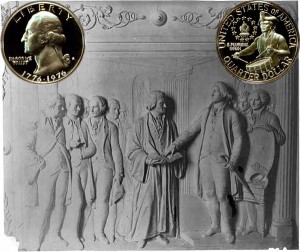Today, the Washington Bicentennial Quarter Coin remembers the first inauguration of the first president on April 30, 1789.
Both before and after he officially took office, President Washington queried several people about the etiquette the president should observe in office.
Found in Volume 10 of the Writings of George Washington compiled by Jared Sparks and published in 1836, a section outlined George Washington’s concerns:
=====
The situation of the President being novel, and without any precedents by which he could be guided, he was at a loss to determine what system of conduct, in matters of etiquette and private intercourse, would be the most convenient to himself, the best suited to his station, and the most acceptable to the public. That he might be enabled to decide and act in conformity with the views of those, in whose judgment he confided, he sent the following Queries to the Vice-President, Mr. Jay, Mr. Hamilton, Mr. Madison, and perhaps others, with a request that they would respectively communicate their sentiments on the subject of them.
Some of these gentlemen, if not all, gave answers in writing, but the only answer found among Washington’s papers is that of the Vice-President.
1. Whether a line of conduct, equally distant from an association with all kinds of company on the one hand, and from a total seclusion from society on the other, ought to be adopted by him? And in that case, how is it to be done ?
2. What will be the least exceptionable method of bringing any system, which may be adopted on this subject, before the public and into use ?
3. Whether, after a little time, one day in every week will not be sufficient for receiving visits of compliment?
4. Whether it would tend to prompt impertinent applications, and involve disagreeable consequences, to have it known that the President will, every morning at eight o’clock, be at leisure to give audience to persons, who may have business with him?
5. Whether, when it shall have been understood, that the President is not to give general entertainments in the manner the presidents of Congress have formerly done, it will be practicable to draw such a line of discrimination, in regard to persons, as that six, eight, or ten official characters, including in rotation the members of both Houses of Congress, may be invited informally, or otherwise, to dine with him on the days fixed for receiving company, without exciting clamors in the rest of the community?
6. Whether it would be satisfactory to the public for the President to make about four great entertainments in a year, on such great occasions as the anniversary of the Declaration of Independence, the alliance with France, the peace with Great Britain, the organization of the general government; and whether arrangements of these two last kinds could be in danger of diverting too much of the President’s time from business, or of producing the evils, which it was intended to avoid by his living more recluse than the presidents of Congress have heretofore lived?
7. Whether there would be any impropriety in the President’s making informal visits; that is to say, in his calling upon his acquaintances or public characters, for the purpose of sociability or civility? And what, as to the form of doing it, might evince these visits to have been made in his private character, so as that they may not be construed into visits from the President of the United States ? And in what light would his appearance rarely at tea-parties be considered?
8. Whether, during the recess of Congress, it would not be advantageous to the interests of the Union for the President to make the tour of the United States, in order to become better acquainted with their principal characters and internal circumstances, as well as to be more accessible to numbers of well- informed persons, who might give him useful information and advice on political subjects?
9. If there is a probability, that either of the arrangements may take place, which will eventually cause additional expenses, whether it would not be proper that those ideas should come into contemplation at the time when Congress shall make a permanent provision for the support of the executive?
Remarks. On the one side, no augmentation can be effected in the pecuniary establishment, which shall be made in the first instance for the support of the executive. On the other, all moneys destined to that purpose, beyond the actual expenditures, will be left in the treasury of the United States, or sacredly applied to the promotion of some national objects.
Many things, which appear of little importance in themselves and at the beginning, may have great and durable consequences from their having been established at the commencement of a new general government. It will be much easier to commence the administration upon a well-adjusted system, built on tenable grounds, than to correct errors, or alter inconveniences, after they shall have been confirmed by habit. The President, in all matters of business and etiquette, can have no object but to demean himself in his public character in such a manner as to maintain the dignity of his office, without subjecting himself to the imputation of superciliousness or unnecessary reserve. Under these impressions, he asks for your candid and undisguised opinion.
=====
The Washington Bicentennial Quarter Coin shows against the panel detail from bronze doors for the east portico of the Senate wing showing the first presidential inauguration, circa 1855.
